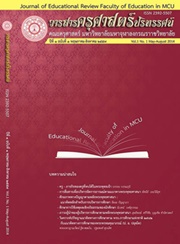Leadership of Education Administrators in Buddhism
Main Article Content
Abstract
Thai society nowadays is changing rapidly and causing foundation
problems and other issues, especially moral problems. When morality declines,
individual behaviors of personnel in organizations, educational institutions and
society in general affects other people and society. To manage educational
personnel in schools effectively, administrators must be able to operate their school
well. With management potential, skills and vision, the executives can achieve
personnel management in schools successfully. This concept suggests that
leadership of school administrators require Buddhist principles to enhance prominent
leadership of the executives and to have them well recognized in organization and
society. Leadership of education administrators according to Buddhism were as
follows: 1) Loving-kindness; the administrators should work with love and treat their
subordinates with love and justice, 2) Compassion; the administrators should
encourage their subordinates to learn current situations and should arrange
demonstrative activities regularly, 3) Sympathetic Joy; administrators should provide
chances for personnel to express their capability and help contribute the
dissemination of work and achievement of personnel, and 4) Equanimity; the
executive should follow the rules of law and work with honesty and trust-worthy.
Article Details
ทัศนะและความคิดเห็นที่ปรากฏในบทความในวารสารฉบับนี้ถือเป็นความรับผิดชอบของผู้เขียนบทความนั้นเพียงผู้เดียว และไม่ถือเป็นทัศนะและความรับผิดชอบของกองบรรณาธิการ
กองบรรณาธิการขอสงวนสิทธิ์ในการคัดเลือกบทความลงตีพิมพ์และจะแจ้งให้เจ้าของบทความทราบหลังจากผู้ประเมินบทความตรวจอ่านบทความแล้ว
ต้นฉบับที่ได้รับการตีพิมพ์ในวารสารครุศาสตร์ปริทรรศน์ คณะครุศาสตร์ มหาวิทยาลัยมหาจุฬาลงกรณราชวิทยาลัย ถือเป็นกรรมสิทธิ์ของคณะครุศาสตร์ มหาวิทยาลัยมหาจุฬาลงกรณราชวิทยาลัย ห้ามนำข้อความทั้งหมดหรือบางส่วนไปพิมพ์ซ้ำ เว้นเสียแต่ว่าจะได้รับอนุญาตจากมหาวิทยาลัยฯ เป็นลายลักษณ์อักษร


